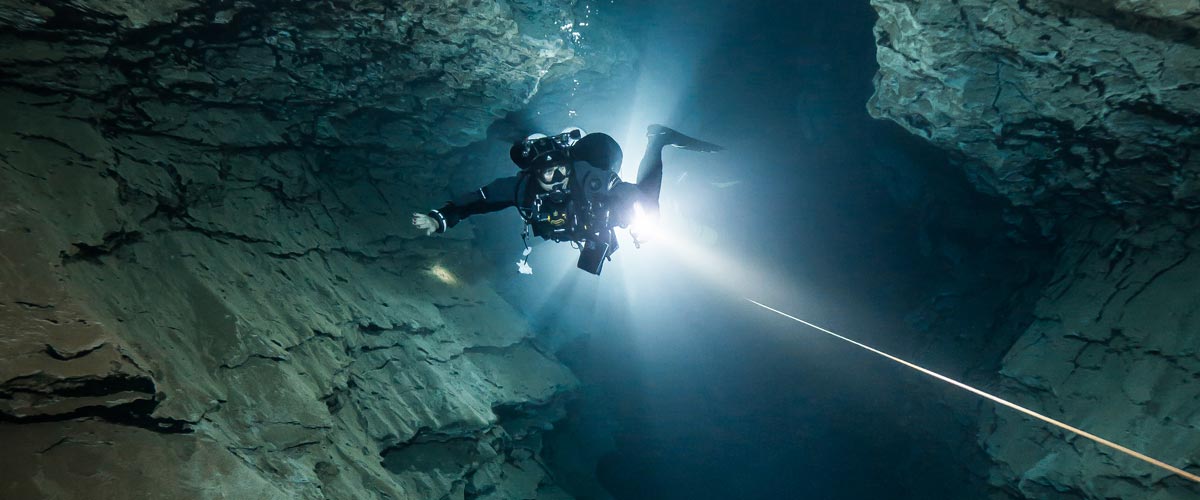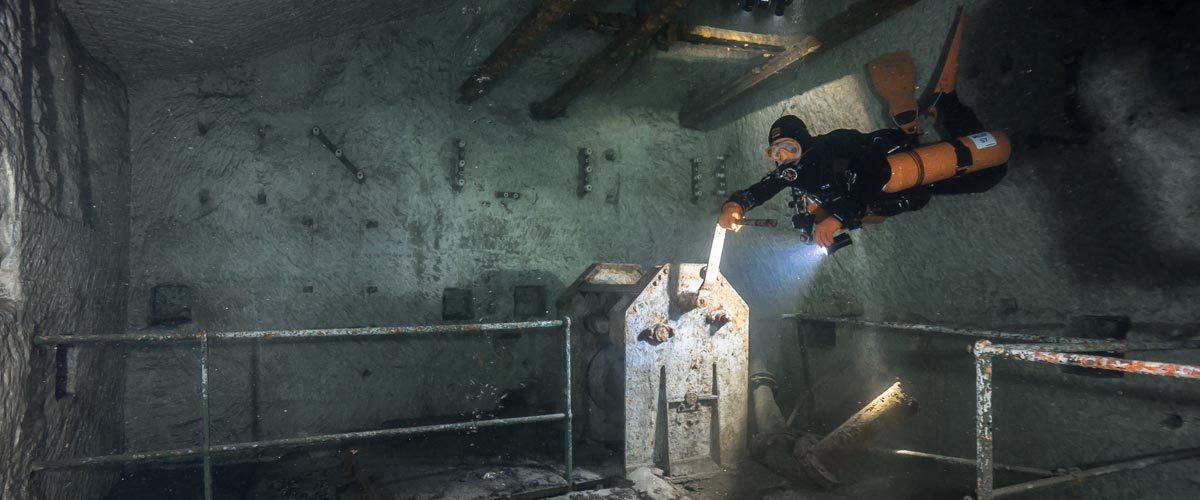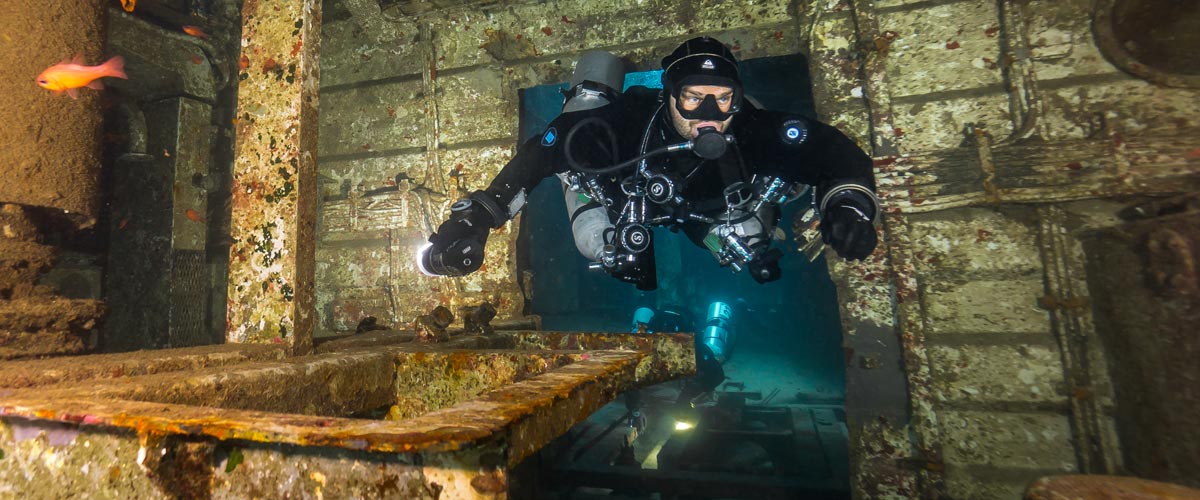Dive Training Blogs
Are you ready for your next course?
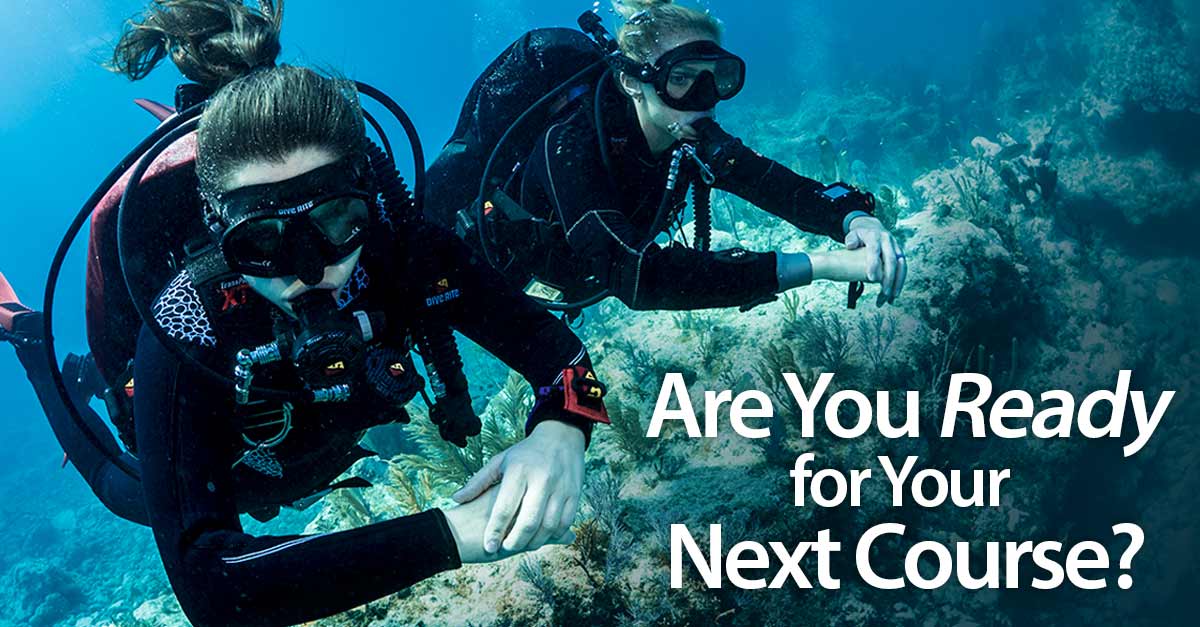
By Jesse Iacono
Nothing matches the excitement of taking a new scuba course to explore new skills, equipment, and environments. It isn’t hard to see why many divers want to take as many courses as quickly as possible. The hardest part of approaching advanced training is not WHICH course to take next, but WHEN you are ready to take it. Whether you are newly open-water certified or moving through the ranks of technical diving, keep the following information in mind to ensure you get the most out of every course you take.
When it comes to taking things to the next level, we can break down a diver’s readiness into two categories: physical readiness and mental readiness. Showing both the attention they deserve will not only guarantee you a better time in your course but also reduce any unnecessary risk.
Physical Readiness
Physical readiness refers to mastering the skills and equipment at your current level before moving forward. Every course you take will build on the fundamental diving skills you have learned in previous courses, and instructors have the right to ask you to demonstrate proficiency in skills from previous courses before beginning theirs. If you have not taken the time to build muscle memory and turn your skills into second-nature responses, then you are almost certain to struggle with any new skills or equipment thrown on top of that.
Does this mean you can’t take another course until you are a guru of every single scuba skill? No, of course not! But it does mean that you need to be comfortable enough with your current skill set to perform familiar skills in new environments (or equipment) and also learn more complex skills that build on those learned previously.
Let’s take a look at a few situations where this comes into play
- An Open Water Scuba Diver wants to take a night diving course but has not taken the time to solidify buoyancy and regulator recovery skills. Are they setting themselves up for an appropriate response when a “normal” issue, such as a regulator getting knocked out or a shift in buoyancy, happens in the darkness?
- A Rescue Diver wants to take a drift diving course in Mexico. They have lots of dives, but all have been conducted from shore and no deeper than 40 feet. Should the diver move directly to a course that likely involves a previous understanding of diving to deeper depths and diving off a boat?
- A newly certified Advanced Nitrox/Decompression Procedures Diver wants to take a Trimix course. If they have not spent time becoming familiar with managing their deco cylinder and performing gas switches, are they likely to succeed when a second deco cylinder is added and multiple gas switches must be made?
As you can see, some situations are pretty clear as to whether a diver is physically ready to participate in a particular course or not. Others may not be so obvious. There isn’t always a linear progression of courses and we can tend to get hung up on titles, assuming that earning a certain rating insinuates a general level of overall competency and ability. You need to look at each course you have taken and acknowledge which specific skills they have developed. Once this is done, a diver can accurately determine whether they have the required skill set to move onto their next desired learning venture.
Mental Readiness
Mental readiness refers to an internal level of comfort and understanding that must be developed before moving forward. This is not as simple as demonstrating proficiency at performing a skill. There are clues that instructors can pick up on to evaluate your mental readiness but, at the end of the day, it is something that only you truly know, and it will certainly expose itself during training if you do not approach it honestly.
Mental readiness develops over time with experience in the water and will strengthen alongside your physical readiness. It will vary from person to person – while one buddy may be entirely comfortable several dives after certification, another may take dozens of dives to feel the same way. Development can be impacted by a variety of contributing factors unique to each person.
You should think of mental readiness as a balance of:
- Feeling comfortable enough diving at your current level to be able to move into a new environment or skill set without becoming entirely overwhelmed or panicking.
- Understanding the intent of your previous skills enough to adapt to unique challenges that arise and apply them to different environments or types of diving.
Again, let’s look at a couple situations where this comes into play
- An Open Water Scuba Diver performs well and is very comfortable diving in their local shallow-water dive site. When they dive off the boat, they feel very nervous and uneasy during the descent and ascent when they cannot clearly reference the bottom. Are they ready to enroll in a course that exposes them to deeper diving?
- A Cavern Diver can perform all skills proficiently but frequently swims away from their buddy and the line. They write it off as no big deal because it is only a cavern and you can’t get “that lost.” Is this diver ready to enter a cave course where they will go beyond the cavern zone and lose sight of the exit?
Mental readiness is tricky because the diver that lacks it is often unaware that they do, or they don’t realize the implications for more advanced diving. Developing a continuous self-evaluation strategy early on is key to help ensure readiness when moving forward.
Continuing education is something that every diver should participate in, but not before they have honestly assessed their readiness to do so. The combination of mental and physical readiness helps us to be our best diver self and maximize the opportunity for fun in the aquatic environment. The point of taking courses is to expose yourself in a controlled manner to new things that may make you a bit uncomfortable but will unlock more diving possibilities. Mistakes are going to be made and learning is going to happen. Consider what is involved in the next course you desire to take and be sure to give extra practice to the skills most relevant to it, so it is the new material you are focusing on learning and not the old.
To find out more about International Training, visit www.tdisdi.com.

Blogs
Intro to Tech: What is it about?
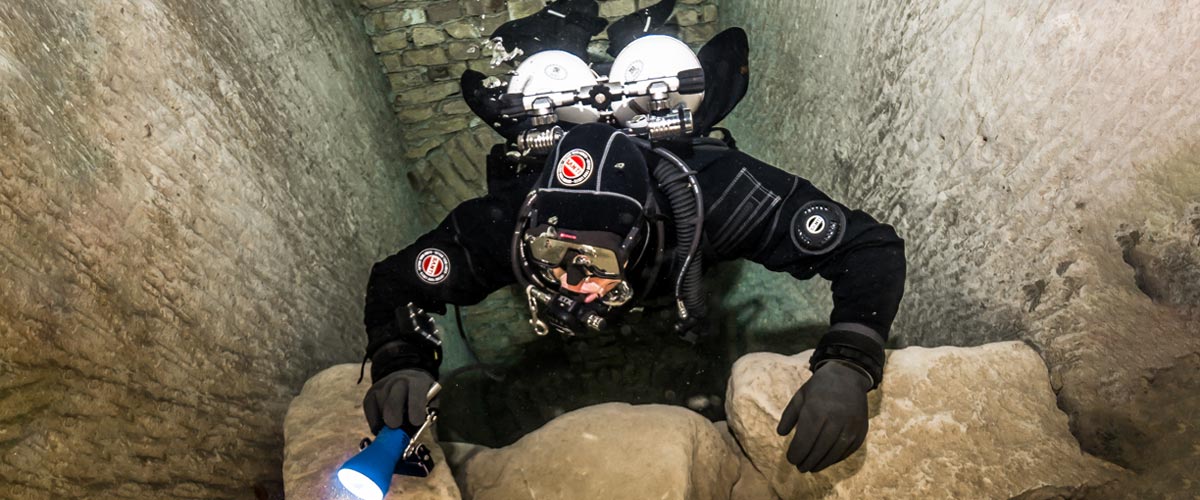
Article by José Pablo Mir
Pictures by Cezary Abramowski
The world of technical diving is exciting. It opens the door to new sites, depths, and bottom times. More importantly, it opens our minds to a new way of planning, facing, and experiencing dives, even those not purely technical.
Becoming a technical diver is a process, and like in other aspects of life, we should find the proper entry point that suits us best based on our knowledge and experience. The Introduction to Technical Diving course from TDI -the world’s largest and most recognized technical diving teaching organization- is the best option for divers who have yet to gain experience in the fundamental aspects of this new practice. The course’s content and its embrace of new techniques and technologies make it possible to acquire a solid foundation to learn and gain experience in this practice properly.
Becoming a technical diver is not something that happens overnight, whether deciding to become one or receiving a certification card stating we are now technical divers. It is a slow process extending farther away than any introductory course. It requires effort and dedication. But it will bring us satisfaction from day one -or two.
It is a matter of mentality
First, we must understand and accept that technical diving, involving greater depths, longer bottom times, exotic gases, virtual or real ceilings, and more, comes with higher levels of risk than the sport diving we have been practicing until now.
Although this discussion usually starts with a warning about risks, as I’ve done in the previous sentence, our practice is not a game of chance.
Technical diving is a rational activity that requires maturity and good judgment, and we will put everything into ensuring that each dive is a successful one -meaning we return from it safe and sound. With this understanding, we will strive to establish a mental attitude more aligned with our practice and its realities.
This new “technical diver” mindset we will develop will lead us to be more cautious in our executions, more analytical in our plans, more rational in our strategies, and more detailed in our procedures.
Experience will keep teaching us to know ourselves better, to keep our anxiety and other emotions under control, and to manage our impulses. Over time, our senses will sharpen, and we will be more attentive to the particulars of the situation we find ourselves in.
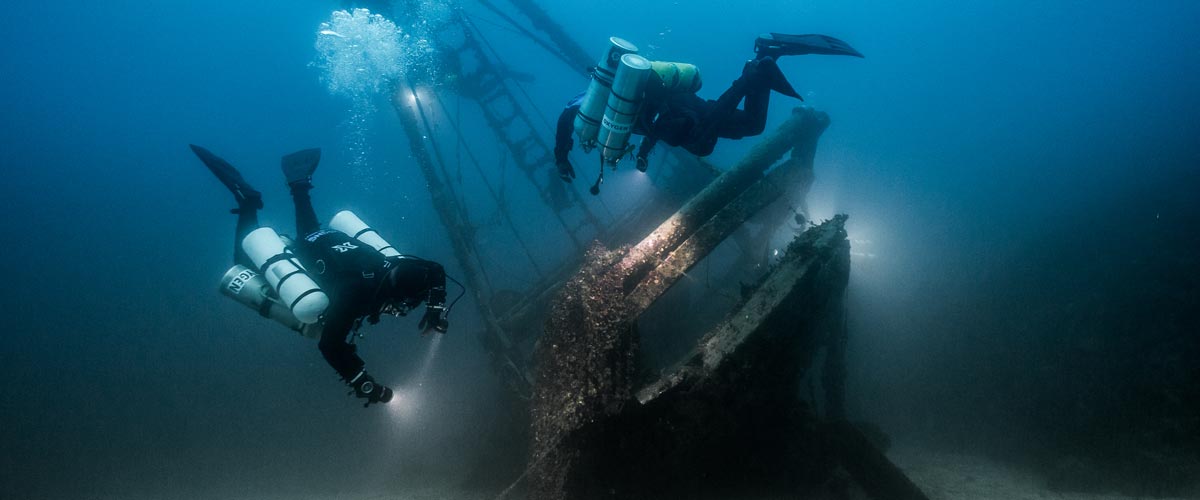
Strategies and procedures
Our strategies, those broad guiding lines tracing the path to follow, from how to approach planning to where, with what, and how we are willing to get there, will be more specific and more practical. Not because they magically become so, but because we will consciously and deliberately frame them that way.
We will establish clear, concise, and realistic procedures. Not only for the undesirable situations that may present themselves but also for those that are part of our dive objectives.
Even though, as technical divers, we often use equipment different from what we were previously accustomed to, it is essential to note that the gear does not make the diver. In a way, we could consider such equipment as the necessary tools to implement what our goal seeks to achieve, according to our strategies and procedures.
Technique plays an important role
We must put our greatest effort into learning and perfecting the different techniques we will be acquiring. Buoyancy, trim, propulsion, cylinder handling, deploying DSMBs and lift bags, valve drills, and more are essential skills we must begin to master to progress in our art. What we cannot do, when we need to do it, can harm us.
Our techniques must be effective and achieve the purpose for which they were devised. But they must also be efficient and require the least resources possible, including the time they take and the effort they demand. Effectiveness and efficiency will prevail over beauty and other considerations that may come to mind, although none of them should be mutually exclusive. A technique executed efficiently and effectively tends to have an inherent beauty.
Refining techniques is a lifelong mission. Some of them will be easy to master from the go; others, on the other hand, will be our life mission and will require many repetitions just to resemble the idea we have in mind of how they should be executed.
We must consider the environment
Our learning, the needs and musts of the practice we engage in, the experience we gradually gain, our strategies and procedures, and even our equipment and tools change with the environment.
Diving in the ocean, everything about us must be suitable for ocean dives. Conditions there rarely emulate those found in a pool, lake, or river. Variable winds and currents, greater depths, visibility conditions, other divers with uncertain skills around us, marine life, maritime traffic, distance from the coast, and many other factors add complexity and uncertainty.
It is never necessary to master the pool on the first day, but planning and aspiring to gradually cope with the ocean’s conditions is essential.
The cost of good training
We are aware that our resources are often scarce in relation to the possibilities of use we could give them if they were not. To a greater or lesser extent, we are part of the economic reality in which we are embedded.
Fortunately, the cost of good technical diver training is not an entry barrier. Comparing training and equipment costs, we see that the former are generally lower. Yes, lower cost for personalized service, essential to our future
performance and safety, than for a series of mass-produced products that are mere, albeit necessary, tools for an end.
The value of good training
The value of the training we received encompasses a range of characteristics, from emotional and methodological to technical and technological. TDI and its Introduction to Technical Diving course offer a deep and modern approach, with a teaching strategy that aims to create thinking divers, not merely obedient ones.
As technical divers, our knowledge is our primary tool. In this type of activity, what we don’t know can harm us.
Is this course optional?
Unfortunately, the fact that this Introduction to Technical Diving course is not a prerequisite for any subsequent training is an invitation to consider it optional. And we all know what usually happens to “optional” under budget constraints.
However, this course should be seen as optional only by those divers who are somehow familiar with the use of technical equipment, who have a mindset more in line with the requirements of this type of diving, who plan and execute the dives the proper “technical” way, who know their gas consumption rate, who are not intimidated by non-decompression tables, who feel comfortable using their dive computers, and know the techniques and have at least an acceptable level of buoyancy, positioning, and propulsion. Those can go straight to a more advanced training course, such as TDI’s Advanced Nitrox.
We must ask ourselves whether or not we are in that group.
Remember our goal: to have fun
Recreational diving is our passion. Jumping into the water carrying heavy equipment and having properly dotted our I’s and crossed our T’s have only one ultimate goal: fun. This is the activity we have chosen as a hobby. We must enjoy it; it must give us pleasure and make us vibrate.
Having a good time is not optional!
Blogs
Four opportunities to go pro in 2024 with Dive Friends Bonaire
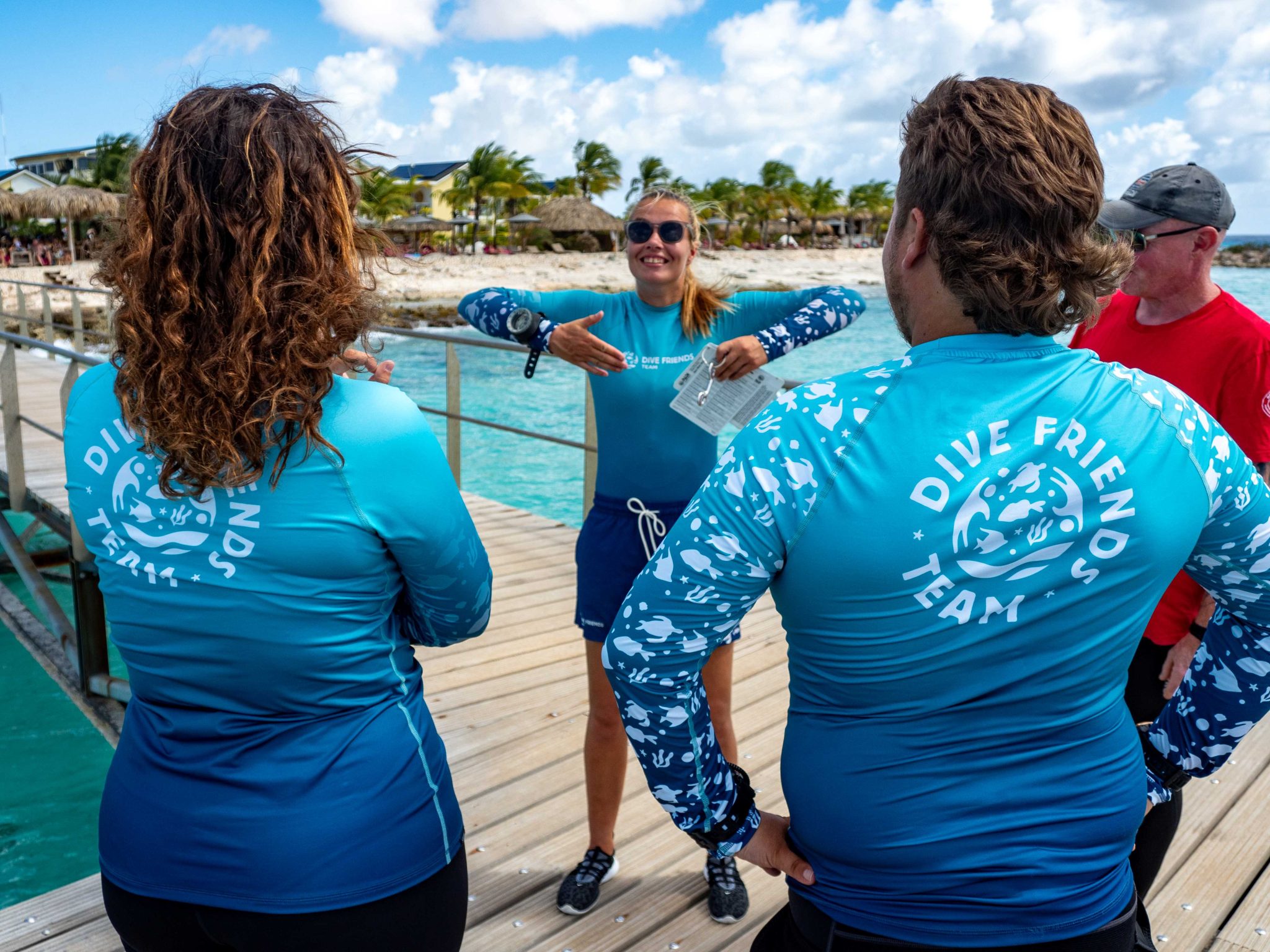
Dive Friends teaches the Instructor Development Course (IDC) several times a year to students who are eager to share their passion for diving with the world.
Dive Friends is known for the personal approach throughout the course. Their in-house course director will lead the students through every essential step, mentoring them to achieve their fullest potential as a dive instructor.
Applications for the following IDC start dates are now open:
- 12 April
- 5 July,
- 20 September
- 29 November
Partnership with Casita Palma
If the student opts for the IDC-Deluxe or IDC-Supreme package, their accommodation will be arranged for them at Casita Palma. This small and quiet resort is within walking distance from Dive Friends Bonaire’s main dive shop location and has everything you need to relax after an intense day of IDC training. Breakfast is included, so the student will always be fuelled and ready for their day.
Contact Dive Friends Bonaire’s Course Director Eddy for more information: coursedirector@divefriendsbonaire.com.
-

 News3 months ago
News3 months agoHone your underwater photography skills with Alphamarine Photography at Red Sea Diving Safari in March
-

 News3 months ago
News3 months agoCapturing Critters in Lembeh Underwater Photography Workshop 2024: Event Roundup
-

 Marine Life & Conservation Blogs2 months ago
Marine Life & Conservation Blogs2 months agoCreature Feature: Swell Sharks
-

 Blogs2 months ago
Blogs2 months agoMurex Resorts: Passport to Paradise!
-

 Blogs2 months ago
Blogs2 months agoDiver Discovering Whale Skeletons Beneath Ice Judged World’s Best Underwater Photograph
-

 Gear Reviews2 months ago
Gear Reviews2 months agoGear Review: Oceanic+ Dive Housing for iPhone
-

 Marine Life & Conservation2 months ago
Marine Life & Conservation2 months agoSave the Manatee Club launches brand new webcams at Silver Springs State Park, Florida
-

 News3 months ago
News3 months agoWorld’s Best Underwater Photographers Unveil Breathtaking Images at World Shootout 2023















